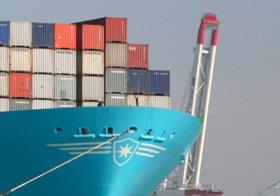
The Maersk shipping line cannot say how long it will continue to impose the extra US$150 per 40ft container levy on freight shippers in South African ports.
Maersk instituted the cumulative levy on 19 May in reaction to the congestion and backlogs in ports as a result of the recent Transnet workers' strike in the country.
Fred Jacobs, Maersk director of corporate relations in Cape Town, told News-24 that it could take weeks to clear the backlog, with ships needing to arrive once more in the correct order, and freight stacked in the port where it is not supposed to be having to be delivered to the appropriate spots.
Mr Jacobs says Maersk will take the requirements of its clients into consideration, and will focus on freight it considers time-sensitive, while pointing out that the availability of all resources in the logistics chain also has to be taken into account.
He explains that the strike forced Maersk to miss certain ship departure times, add extra shifts to certain routes, and organise re-shipment of freight, incurring additional storage costs.
The reorganising of containers and shipping activities has been seriously disrupted since 10 May, when the strike began, with Mr Jacobs noting that the cost to Maersk could amount to millions per week.
Anton Rabe, chairperson of Fruit South Africa, which represents fruit exporters, has said the strike may have cost shipping lines R600m – if this were to be recovered from the deciduous fruit industry alone, it would represent more than last year's net farming income.
In a letter to Public Enterprises Minister Barbara Hogan, the fruit industry said it would encourage fellow exporters to send the accounts for the extra container levy the shipping lines are charging them to Transnet for payment.
The fruit industry also indicated that it would take the issue of the congestion charge to the Competition Commission and asked exporters to record that they are paying the surcharge under protest.
On Tuesday (8 June), Transnet's acting CEO Chris Wells told journalists in parliament that Transnet could not be held contractually liable for the damage that export activities, in particular, had suffered because of the strike.
Wells said that Transnet had not yet determined the rand value of the strike, but it could take three months to make up the backlog, particularly in terms of container transport, which had been worst affected. He said Transnet had instituted a plan of 'military proportions' to wipe out the backlog.



